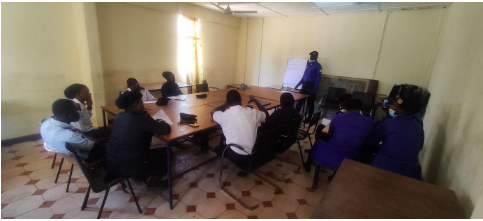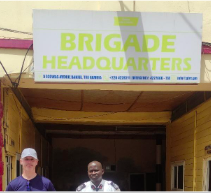Learning and Partnership: Supporting the Gambia Fire and Rescue Service
- Paul Cowin
- Sep 12, 2025
- 2 min read
By Paul Cowin
Earlier this year, I returned to The Gambia for my third visit, working with the Gambia Fire and Rescue Service (GFRS) through the long-standing GAFSIP partnership. After 24 years in the UK Fire and Rescue Service, my work overseas has been both humbling and inspiring, a reminder of the universal challenges we face in protecting communities, but also of the stark differences in resources and infrastructure.
Fire safety education
One of the most rewarding parts of the trip was delivering a fire safety session to children at JOFI School. We covered everything from safe phone charging to candle safety and escape plans. Simple but vital messages resonate strongly in communities where electricity is unreliable and candles are widely used. The children threw themselves into the activities, demonstrating stop, drop and roll and learning how to crawl low under smoke, before proudly taking those lessons back to their families. Education is one of the most powerful tools in prevention, and in resource-limited settings, it may be the most important.
Working with stations and crews
I also visited Kotu Fire Station, where one fire appliance serves 27 personnel on 24-hour shifts. The dedication of the crews is clear, even though they contend with ageing equipment, extreme heat, and at times hostility when water supplies run out. These are universal firefighter challenges, magnified by context: resource scarcity, high demand, and community expectations. Yet morale and professionalism remain high.
Community resilience and healthcare links
Beyond the fire stations, I was privileged to spend time at Wullinkamma Arribaja baby clinic, which supports children who have lost their mothers or whose families cannot provide care. The clinic runs almost entirely on donations and volunteer effort, providing essential healthcare and infant nutrition. For me, this highlighted how closely health and fire services intertwine in The Gambia. Prevention, early intervention, and community trust are central to both.
Sea rescue and future risks
Along the coast, I visited several sea rescue stations. These crews respond to drownings, fishing accidents and body recoveries, yet many lack seaworthy boats or engines. With new hotels and roads attracting more tourism, demand on these services will only increase. Without investment in equipment and training, the gap between need and capability could grow rapidly.
Shared challenges, shared opportunities
Whether in Serrekunda market, where fire risks sit side by side with fragile livelihoods or in discussions with Deputy Chief Fire Officer Mariama Jobarteh about future training centres and corporate partnerships, the themes were consistent. Resources are limited. Risks are growing. But the commitment of firefighters and communities to protect each other is unwavering.
Partnerships like GAFSIP show what can be achieved when services share expertise, equipment, and solidarity across borders. For those of us in the UK, it is a reminder that prevention, resilience, and community trust remain at the heart of our profession, wherever we serve.
I am grateful to ACFO Samba Jacob Jarjue, the Firefighters and the communities who welcomed me, and to GAFSIP for enabling this ongoing collaboration. The challenges in The Gambia are immense, but so too is the determination to meet them.
.png)



















Comments